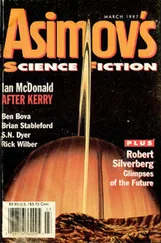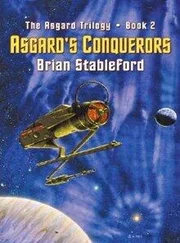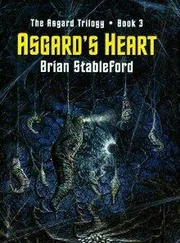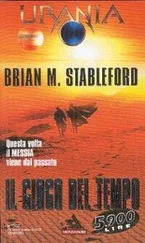Brian Stableford - Inherit the Earth
Здесь есть возможность читать онлайн «Brian Stableford - Inherit the Earth» весь текст электронной книги совершенно бесплатно (целиком полную версию без сокращений). В некоторых случаях можно слушать аудио, скачать через торрент в формате fb2 и присутствует краткое содержание. Год выпуска: 1995, Издательство: Dell Magazines, Жанр: Фантастика и фэнтези, на английском языке. Описание произведения, (предисловие) а так же отзывы посетителей доступны на портале библиотеки ЛибКат.
- Название:Inherit the Earth
- Автор:
- Издательство:Dell Magazines
- Жанр:
- Год:1995
- ISBN:нет данных
- Рейтинг книги:5 / 5. Голосов: 1
-
Избранное:Добавить в избранное
- Отзывы:
-
Ваша оценка:
- 100
- 1
- 2
- 3
- 4
- 5
Inherit the Earth: краткое содержание, описание и аннотация
Предлагаем к чтению аннотацию, описание, краткое содержание или предисловие (зависит от того, что написал сам автор книги «Inherit the Earth»). Если вы не нашли необходимую информацию о книге — напишите в комментариях, мы постараемся отыскать её.
Inherit the Earth — читать онлайн бесплатно полную книгу (весь текст) целиком
Ниже представлен текст книги, разбитый по страницам. Система сохранения места последней прочитанной страницы, позволяет с удобством читать онлайн бесплатно книгу «Inherit the Earth», без необходимости каждый раз заново искать на чём Вы остановились. Поставьте закладку, и сможете в любой момент перейти на страницу, на которой закончили чтение.
Интервал:
Закладка:
Damon glanced sideways at Kachellek, whose face had set like stone. He didn’t doubt that this was, indeed, Silas Arnett; nor did he doubt that Arnett had been stripped of the apparatus that normally protected him against injury, aging, and the effects of torture. But if they intend to force some kind of confession out of him , Damon thought, everyone will know that it’s quite useless. Take away a man’s ability to control pain and he can be made to say anything at all. What kind of “absolute proof” is that?
The image abruptly shifted to display a virtual courtroom. It was a highly impressionistic image—a cartoon rather than a serious attempt at videosynthesis. The accused man who stood in the dock was a caricature, but Damon had no difficulty in recognising him as Silas Arnett. The twelve jurors who were positioned to his left were mere sketches, and the person whose position was to the right—who was presumably the prosecutor—had little more in the way of features than they did. The black-robed judge who faced Arnett didn’t look any more real, but in his case it wasn’t for lack of detail; his face had been carefully drawn, and Damon’s expert eye judged that it had been carefully designed for convincing animation.
“Please state your name for the record,” said the judge. His voice was deep and obviously synthetic.
“I’ll do no such thing,” said the figure in the dock. Damon recognised Silas Arnett’s voice, but in the circumstances he couldn’t be sure that the words hadn’t been sythesized by a program that had analysed the voice.
“Let the name Silas Arnett be entered in the record,” said the judge. “I am obliged to point out, Dr. Arnett, that there really is a record. Every moment of this trial will be preserved for posterity. Any and all of your testimony may be broadcast, so you should conduct yourself as though the whole world were watching. Given the nature of the charges which will be brought against you, that may well be the case.”
“I didn’t think you people bothered with interrogations,” Arnett said. It seemed to Damon that he was injecting as much contempt into his voice as he could. “I thought you operated strictly on a sentence first, verdict afterwards basis.”
“It sometimes happens,” said the judge, “that we are certain of one man’s guilt, but do not know the extent to which his collaborators and accomplices were involved in his crime. In such cases we are obliged to undertake further enquiries.”
“Like the witch-hunters of old,” said Arnett, grimly. “I suppose it would make it easier to select future victims if the people you select out for murder were forced to denounce others before they die. Any testimony you get by such means is worse than worthless; this is a farce, and you know it.”
“We know the truth,” said the judge, flatly. “Your role is merely to confirm what we know.”
“Fuck you,” Arnett said, with feeling. It was a direly old-fashioned curse: something out of Conrad Helier’s Ark, which should not have any force in the modem world. The significance of the word, and the act it described, had changed considerably since the old world died; the word had lost the warrant of obscenity it had once possessed.
“The charges laid against you, Silas Arnett, are these,” said the machine-made voice, while the judge’s virtual lips moved in perfect sync. “First, that in the years 2070-2080 you did conspire with others, including Conrad Helier, Mary Hallam, Eveline Hywood and Karol Kachellek, to cause actual bodily harm to between thirteen billion and fifteen billion individuals by disabling their reproductive organs. Second, that you did collaborate with others, including those named, in the design, manufacture, and distribution of the various virus species known as meiotic disrupters and chiasmalytics. How do you plead to these charges?”
Damon was astonished by his own reaction, which was more extreme than he could have anticipated. He was seized by an actual physical shock which left him trembling. He turned to look at Karol Kachellek, but the blond man wouldn’t meet his eye. Kachellek seemed remarkably unperturbed, considering that he had just been accused of manufacturing and spreading the great plague of sterility whose dire effects he and his collaborators had so gloriously subverted.
“If you had any real evidence,” Arnett said, while the face of his simulacrum took on a strangely haunted look, “you’d have brought these charges in a real court of law. The simple fact that I’m here demonstrates the absurdity and falseness of any charges you might bring.”
“You’ve had a 120 years to surrender yourself to judgment by another court,” said the judge, his voice acidly mechanical. “This court is the one which has found the means to bring you to trial; it is the one which will judge you now. You will be given every opportunity to enter a defense, should you so wish and to justify your criminal actions as best you can, before sentence is passed upon you.”
“I refuse to pander to your delusions. I’ve nothing to say.”
“Our investigations will be scrupulous nevertheless,” the judge said. “They must be, given that the charges, if true, require sentence of death to be passed upon you.”
“You have no right to do that!”
“On the contrary. We hold that what society bestows upon the individual, through the medium of technology, society has every right to withdraw from those who betray their obligations to others. This court intends to investigate the charges laid against you as fully as it can, and when they are proven it will invite any and all interested parties to pursue those who ought to be standing beside you in the dock. None will escape, no matter what lengths they may have gone to in the hope of evading judgment. There is no station of civilization sufficiently distant, no deception sufficiently secure, to place a suspect beyond our reach.”
What’s that supposed to mean? Damon wondered. Do they really believe that Conrad Helier is alive, and that he faked his death in order to avoid punishment for what he’d done? “Karol—” He said aloud, but Kachellek raised a hand to instruct him to be quiet.
“The people you’ve named are entirely innocent of any crime,” Arnett said, anxiously. “You’re insane if you think otherwise.”
Damon tried to judge from the timbre of the voice the extent to which Arnett’s pain-control system had been dismantled, so as to force him to suffer physical symptoms of distress to which he had long been unaccustomed. If there were indeed a reality behind this cartoonish charade Arnett’s body must by now be an empire at war, and he must be feeling all the violence of the conflict. The tireless molecular agents which benignly regulated the cellular commerce of his emortality were dying beneath the onslaught of custom-designed assassins: Eliminators in miniature, which would exterminate them all, given time, and leave their detritus to be flushed out by his kidneys. Even if Arnett had not yet been subjected to actual torture he must feel the returning grip of his own mortality, and the deadly cargo of terror which came with it.
The picture dissolved, and was replaced by an image of Conrad Helier, which Damon immediately recognised as a famous section of archive footage.
“We must regard this new plague not as a catastrophe but as a challenge,” Helier stated, in ringing tones. “It is not, as the Gaian Mystics would have us believe, the vengeance of Mother Earth upon her rapists and polluters, and no matter how fast and how far it spreads it cannot and will not destroy the species. Its advent requires a monumental effort from us, but we are capable of making that effort. We have, at least in embryo, technologies which are capable of rendering us immune to aging, and we are rapidly developing technologies which will allow us to achieve in the laboratory what fewer and fewer women are capable of doing outside it: conceive and bear children. Within twenty or thirty years we will have what our ancestors never achieved: democratic control over human fertility, based in a New Reproductive System. We have been forced to this pass by evil circumstances, but let us not undervalue it; it is a crucial step forward in the evolution of the species, without which the gifts of longevity and perpetual youth might have proved a double-edged sword. ...”
Читать дальшеИнтервал:
Закладка:
Похожие книги на «Inherit the Earth»
Представляем Вашему вниманию похожие книги на «Inherit the Earth» списком для выбора. Мы отобрали схожую по названию и смыслу литературу в надежде предоставить читателям больше вариантов отыскать новые, интересные, ещё непрочитанные произведения.
Обсуждение, отзывы о книге «Inherit the Earth» и просто собственные мнения читателей. Оставьте ваши комментарии, напишите, что Вы думаете о произведении, его смысле или главных героях. Укажите что конкретно понравилось, а что нет, и почему Вы так считаете.
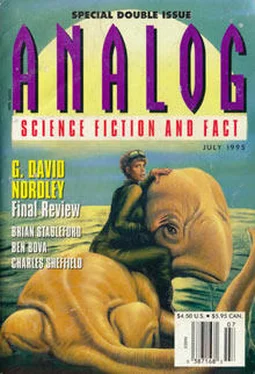

![Лаура Бренз - Потомственная ведьма[Inherit the Witch]](/books/79609/laura-brenz-potomstvennaya-vedma-inherit-the-witch-thumb.webp)
